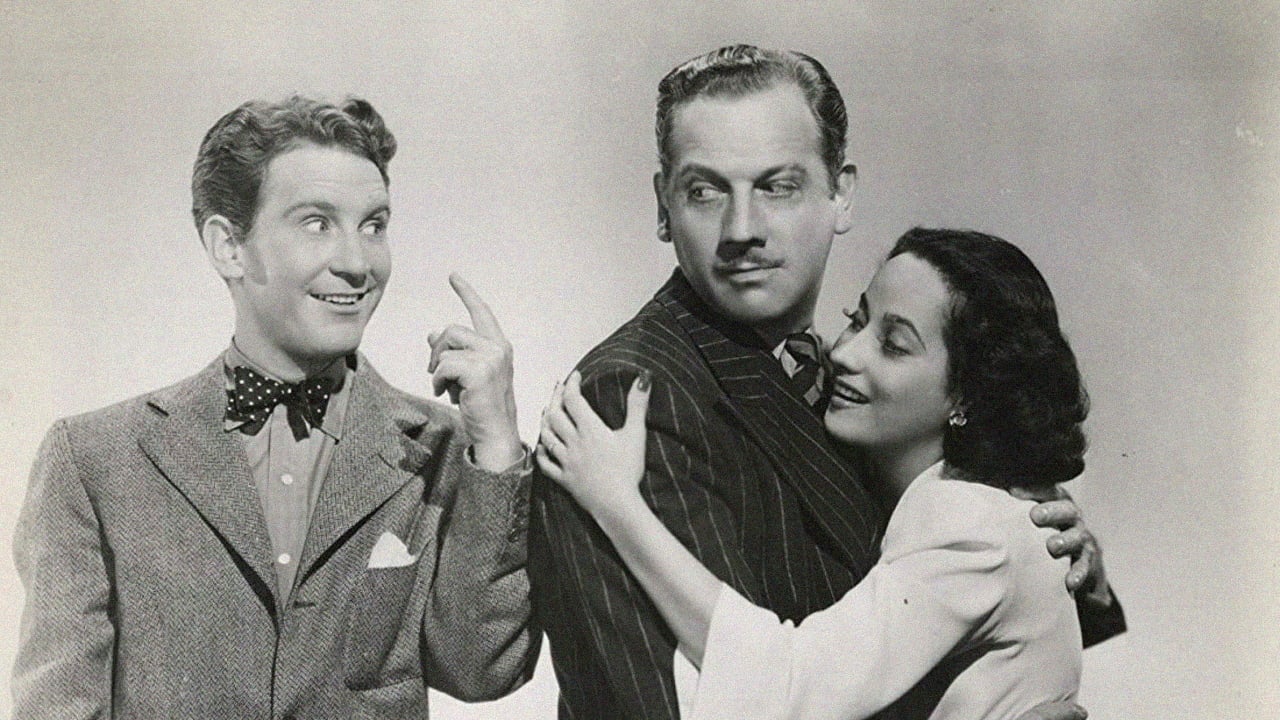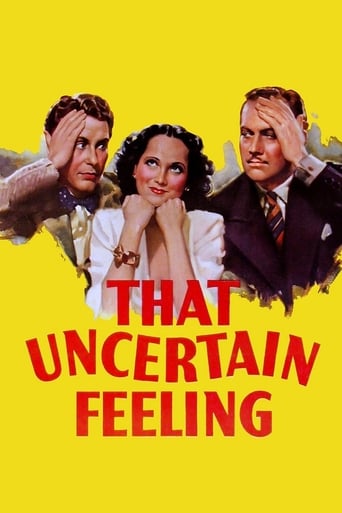ManiakJiggy
This is How Movies Should Be Made
Dynamixor
The performances transcend the film's tropes, grounding it in characters that feel more complete than this subgenre often produces.
pointyfilippa
The movie runs out of plot and jokes well before the end of a two-hour running time, long for a light comedy.
Derry Herrera
Not sure how, but this is easily one of the best movies all summer. Multiple levels of funny, never takes itself seriously, super colorful, and creative.
writers_reign
Even the great Lubitsch can't hit one out of the park every At Bat; on the other hand even bush league Lubitsch is light years ahead of Major League Hitchcock let alone the likes of Mitchell Liesen, so this lightweight entry is still worth the price of admission. Eve Arden had yet to come into her own but she still registers strongly in a supporting role whilst the three leads, Melvyn Douglas, Merle Oberon and Burgess Meredith keep things bubbling along. The plot has been around the block more than once - in this case the source material is a play by Victorien Sardou, active in French Theatre around the same time as Georges Feydeau, who had a higher international profile - but Lubitssch is still able to extract a respectable mileage out of it.
arfdawg-1
The Plot.Against her better judgment, happily married Jill Baker is persuaded to see a popular psychoanalyst about her psychosomatic hiccups. Soon, she's disillusioned about husband Larry; and one day in the doctor's waiting room she meets pianist Alexander Sebastian, who's even more confused than she is. Can this marriage be saved? I suppose this is an example of a "modern-thinking" movie of the 40s. It's very dated.To be sure, there are some funny moments, but this is a movie where women lie about their age! Come on.
theowinthrop
THAT UNCERTAIN FEELING is based on a French play by Victorien Sardou. He was the leading French dramatist for most of the 19th Century, but his specialty of "the well made play" was lampooned into oblivion by later writers (most notably George Bernard Shaw, who labeled such carefully plotted works as "Sardoodledum"). Actually, like such good 20th Century dramatists as Terrance Rattigan, a really good drama can survive it's structural mechanics if the characterizations stand out to be true. Sardou's serious plays (like his historical plays) are too stiff to work today. But his lighter fare might still be able to work if up-dated.Lubitsch reset the story into modern New York. Melvin Douglas is married to Merle Oberon, and is a successful attorney. But their seemingly happy marriage has hit a dull spot. He is not aware of this but she is noticing his idiosyncrasies, and finding some too annoying for words: His habit of sticking his finger into her middle (playfully, of course) and saying "Keex" drives her up a wall. She tries a popular psychiatrist (Alan Mowbray, in a kind of reprise of a similar role from Lubitsch's DESIRE). Then she goes to an art gallery and meets eccentric pianist Burgess Meredith. He is a man who seems more full of sour, but honest, opinions about everything than he has musical talent. He goes from picture to picture telling Oberon what is wrong with each. "That painting won't live.", he declares of one work. Oberon, who can barely keep looking at it, says, "Thank God for that!".Meredith, with his sour view of most things, is soon ruining one of Douglas's business dinners (for a bunch of Hungarian businessmen, led by Sig Ruman). Douglas has a first rate Hungarian meal, complete with goulash for his guests, and even teaches - or tries to teach Oberon - to say a Hungarian toast for their guests. But Meredith dominates the evening, by insisting on playing a classical piece of piano music, and then 19 variations he has composed on it.Gradually Douglas tries to restore his marriage, but finds Oberon in a deep commitment to Meredith. This leads to one of the best scenes when Douglas and his partner Harry Davenport try to stage an act of cruelty against Oberon for divorce purposes. To do this they have to have Eve Arden as an unsuspecting witness to an escalating argument leading to a slap in the face. But each time Douglas can't bring himself to do it, until he basically downs two or three drinks. In the meantime Arden keeps noticing that Davenport (supposedly giving her dictation) is actually doing everything over and over again, including snapping his fingers at the moment that Douglas and Oberon are supposed to start their argument. The film ends with Oberon considering the good and bad points of Douglas and Meredith, to reach her conclusion about who to stay with. It is an obvious choice, perhaps, and it may seem to take her too long to decide, but the three leads give bright performances (supported by Davenport and Arden and the others). Not on the level of THE MERRY WIDOW or NINOTCHKA, but worth watching for some satisfactory chuckles.
whpratt1
Enjoyed this Classic Comedy with outstanding veteran actors who must have had fun making this film way back in the 1940's. Merle Oberon,(Mrs. Jill Baker),"A Song To Remember",'45, had problems with her hiccups whenever she got upset about things in her life and also the fact that her husband use to poke (keek) her in the stomach, which greatly annoyed her. Jill took these problems to her physician, Alan Mowbray,(Dr. Vengard)," I Wake Up Screaming",'41, who finally found out a solution for her problems. Jill Baker also runs into a crazy pianist and artist, Burgess Meredith (Alexander Sebastian),"Rocky V",'90, who seems to stop her problems with hiccups. However, Jill's husband, Melvyn Douglas (Larry Baker),"Hud",'63, begins to become curious about her relationship with this artist, pianist and all crazy and wild sorts of situations start happening through out the picture. This is definitely a Classic comedy film and if you love to see Merle Oberon act in an entirely different role, this is a good film to view and especially if you are a fan of Modern Art.

